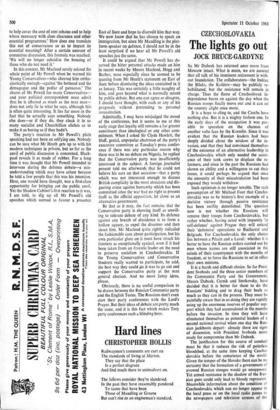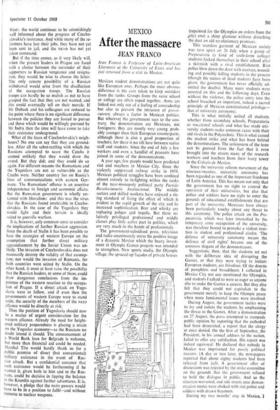The lights go out
CZECHOSLOVAKIA JOCK BRUCE—GARDYNE
So Mr Dubcek has returned once more from Moscow intact. What is more, we are assured
that all talk of his imminent retirement is with- out foundation. The collaborators—the Indras, the Bilaks, the Kolders—may be publicly re- habilitated, but the resistance will remain in charge. Thus the flame of Czechoslovak in- dependence burns on against the day when the Russian troops finally move out and it can set the country alight once more.
It is a hope to cling to, and the Czechs have nothing else. But it is a mighty forlorn one. In the early days of the occupation it was pos- sible to speculate on the chances of another volte face by the Kremlin. Since it was evident that the Russian leaders had been deeply divided about the wisdom of the in- vasion, and that they had convinced themselves of the existence of an alternative leadership in Czechoslovakia which only needed the assist- ance of their tank crews to displace the re- formers, and since in the past the Russians had shown an ability and a willingness to cut their losses, it could perhaps be argued that once the enormity of their miscalculation had been exposed they would withdraw.
Such optimism is no longer tenable. The rash presumption of Mr Michael Foot that Czecho- slovakia was to be history's first example of a decisive victory through passive resistance has been swiftly demolished. The question now is not whether the Russians will remove their troops from Czechoslovakia, but rather whether, having acted with impunity 'in self-defence' against Prague they will extend their 'defensive' operations to Bucharest and Belgrade. For Czechoslovakia the only choice lies between a Main and a Laval: whether it is better to have the Russian orders carried out by men whose names are still associated in the minds of their countrymen with the months of freedom, or to force the Russians to set in office their own minions.
It is a harsh and difficult choice. So far Presi- dent Svoboda and the three senior members of the Communist Party and the Government, Messrs Dubcek, Cernik and Smrkovsky, have decided that it is better for them to do the Russians' bidding and to drag their heels as much as they can in the process. They must be painfully aware that in so doing they are rapidly using up the enormous reserves of popular sup- port which they had accumulated in the months
before the invasion. In time they will have eliminated themselves as potential leaders of a
second national revival when one day the Rus- sian jackboots depart : already there are signs of dissension, with President Svoboda more ready for compromise than Mr Dubcek.
The justification for this course of conduct must be that it reduces the risk of pointless bloodshed, at the same time keeping Czecho- slovakia before the conscience of the world. Given the temper of the Slovaks there can be no
certainty that the formation of a government of
avowed Russian stooges would go unopposed. Yet armed resistance in the shadow of the Rus-
sian guns could only lead to bloody repression. Meanwhile information about the condition of Czechoslovakia which can no longer appear in the local press or on the local radio passes to the newspapers and television screens of the
West: the world continues to be astonishingly well informed about the progress of Czecho-
slovakia's resistance. And while many of the re- formers have lost their jobs, they have not yet been sent to jail, and the NKVD has not yet taken command.
But if the time comes, as it very likely will, when the present leaders in Prague are faced with a choice between the surrender of their supporters to Russian vengeance and resigna- tion, they would be wise to choose the latter. The only remote possibility of a Russian withdrawal would arise from the disaffection of the occupation troops. The Russian troops can hardly be so mulish as not to have grasped the fact that they are not wanted, and this could eventually tell on their morale. If Mr Dubcek and his colleagues are reduced to the point where there is no significant difference between the policies they are forced to pursue and those which would be willingly pursued by Mr Indra then the time will have come to take their resistance underground.
What of the fears of Czechoslovakia's neigh- bours? No one can say that they are ground- less. After all the sabre-rattling with which the Russians attempted to scare the Czechs it seemed unlikely that they would draw the sword. But they did; and they could do so again. For different reasons the Rumanians and the Yugoslays are not as vulnerable as the Czechs were. Neither country lies on Russia's lines of communications with eastern Ger- many. The Rumanians' offence is an assertive independence in foreign and economic affairs.
But the Rumanian government is wholly un- tainted with liberalism: and this was the virus that the Russians found intolerable in Czecho- slovakia. In the case of the Yugoslays they would fight and their terrain is ideally suited to guerrilla warfare.
It is, however, only common sense to consider the implications of further Russian aggression.
Since the death of Stalin it has been possible to base the strategies of western Europe on the assumption that further direct military aggrandisement by the Soviet Union was un- likely. The invasion of Czechoslovakia does not necessarily destroy the validity of that assump- tion; nor would the invasion of Rumania, for both countries were seized by Stalin. On the other hand, it must at least raise the possibility that the Russian leaders, or some of them, could draw dangerous conclusions from the im- potence of the western reaction to the occupa-
tion of Prague. If a direct attack on Yugo- slavia were to follow, and if even then the governments of western Europe were to stand aside, the security of the members of the NATO alliance would be directly at risk.
Thus the position of Yugoslavia should now be a matter of urgent consideration for the western affiance. Already the need for height- ened military preparedness is placing a strain on the Yugoslav economy—as the Russians no doubt intend it should. The announcement of a World Bank loan for Belgrade is welcome, but more than financial aid could be needed.
Marshal Tito would hardly thank us for a public promise of direct (but conventional) military assistance in the event of Rus- sian attack. But a confidential asurance that
such assistance would be forthcoming if he wanted it, given both to him and to the Rus- sians, could be decisive in tipping the balance in the Kremlin against further adventures. It is, however, a pledge that the NATO powers would have to be in a position to fulfil—and without recourse to nuclear weapons.







































 Previous page
Previous page